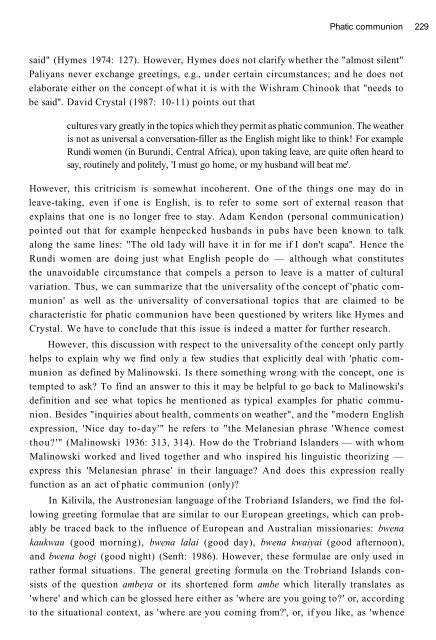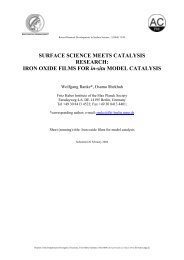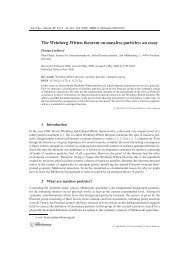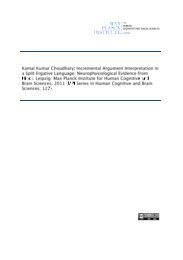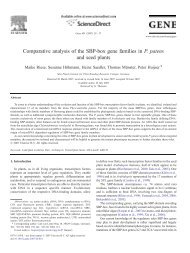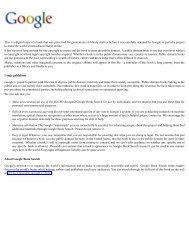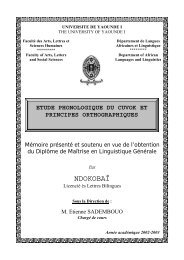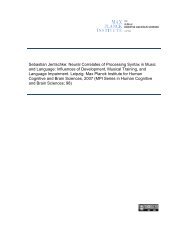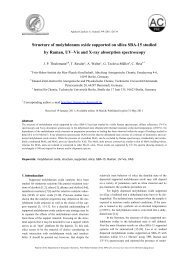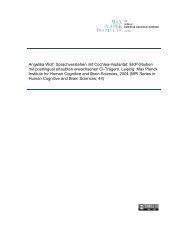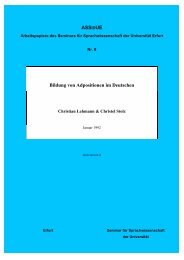Phatic communion - PubMan
Phatic communion - PubMan
Phatic communion - PubMan
Create successful ePaper yourself
Turn your PDF publications into a flip-book with our unique Google optimized e-Paper software.
<strong>Phatic</strong> <strong>communion</strong> 229<br />
said" (Hymes 1974: 127). However, Hymes does not clarify whether the "almost silent"<br />
Paliyans never exchange greetings, e.g., under certain circumstances; and he does not<br />
elaborate either on the concept of what it is with the Wishram Chinook that "needs to<br />
be said". David Crystal (1987: 10-11) points out that<br />
cultures vary greatly in the topics which they permit as phatic <strong>communion</strong>. The weather<br />
is not as universal a conversation-filler as the English might like to think! For example<br />
Rundi women (in Burundi, Central Africa), upon taking leave, are quite often heard to<br />
say, routinely and politely, 'I must go home, or my husband will beat me'.<br />
However, this critricism is somewhat incoherent. One of the things one may do in<br />
leave-taking, even if one is English, is to refer to some sort of external reason that<br />
explains that one is no longer free to stay. Adam Kendon (personal communication)<br />
pointed out that for example henpecked husbands in pubs have been known to talk<br />
along the same lines: "The old lady will have it in for me if I don't scapa". Hence the<br />
Rundi women are doing just what English people do — although what constitutes<br />
the unavoidable circumstance that compels a person to leave is a matter of cultural<br />
variation. Thus, we can summarize that the universality of the concept of 'phatic <strong>communion</strong>'<br />
as well as the universality of conversational topics that are claimed to be<br />
characteristic for phatic <strong>communion</strong> have been questioned by writers like Hymes and<br />
Crystal. We have to conclude that this issue is indeed a matter for further research.<br />
However, this discussion with respect to the universality of the concept only partly<br />
helps to explain why we find only a few studies that explicitly deal with 'phatic <strong>communion</strong><br />
as defined by Malinowski. Is there something wrong with the concept, one is<br />
tempted to ask? To find an answer to this it may be helpful to go back to Malinowski's<br />
definition and see what topics he mentioned as typical examples for phatic <strong>communion</strong>.<br />
Besides "inquiries about health, comments on weather", and the "modern English<br />
expression, 'Nice day to-day'" he refers to "the Melanesian phrase 'Whence comest<br />
thou?'" (Malinowski 1936: 313, 314). How do the Trobriand Islanders — with whom<br />
Malinowski worked and lived together and who inspired his linguistic theorizing —<br />
express this 'Melanesian phrase' in their language? And does this expression really<br />
function as an act of phatic <strong>communion</strong> (only)?<br />
In Kilivila, the Austronesian language of the Trobriand Islanders, we find the following<br />
greeting formulae that are similar to our European greetings, which can probably<br />
be traced back to the influence of European and Australian missionaries: bwena<br />
kaukwau (good morning), bwena lalai (good day), bwena kwaiyai (good afternoon),<br />
and bwena bogi (good night) (Senft: 1986). However, these formulae are only used in<br />
rather formal situations. The general greeting formula on the Trobriand Islands consists<br />
of the question ambeya or its shortened form ambe which literally translates as<br />
'where' and which can be glossed here either as 'where are you going to?' or, according<br />
to the situational context, as 'where are you coming from?', or, if you like, as 'whence


